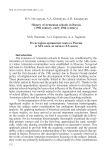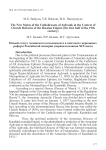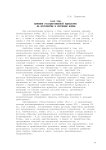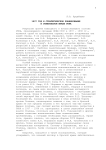Статьи журнала - Новый исторический вестник
Все статьи: 1114

Статья научная
В статье на основе неизвестных документов, хранящихся в Архиве Российской академии наук, рассматривается проблема взаимодействия академического сообщества и власти. Основное внимание автор уделяет оценкам и точкам зрения, сложившимся в середине 1990-х гг. у ведущих российских ученых относительно концепции, механизмов, методов проведения в России либеральных экономических реформ, а также их итогов и последствий. Среди оценок, как показано в статье, преобладали негативные и пессимистические. Особенно острой критике со стороны ведущих ученых подвергались: отказ реформаторов от государственного регулирования, инициированная ими криминальная приватизация, развал производства, недофинансирование науки и образования, резкое социальное расслоение и бедственное положение значительной части общества. Академики вынуждены были признать как отсутствие у реформаторов научно обоснованной программы преобразований, так и опасность для страны избранной ими с помощью зарубежных экспертов стратегии социально-экономического развития страны. Обсуждения и дискуссии о кризисном положении в экономике, социальной сфере и науке, которые проходили в Российской академии наук, в полной мере отразили, с одной стороны, определенную беспомощность российских ученых-экономистов, признание ими невозможности повлиять на решения правительства. С другой - желание академического сообщества разработать как систему конкретных и безотлагательных мер для выхода из тяжелейшего кризиса, так и долгосрочную стратегию научно-технического развития России. Однако академики вынуждены были констатировалось нежелание правительственной бюрократии сотрудничать с научным сообществом, предлагаемые проекты ученых чиновниками высокого ранга игнорировались.
Бесплатно

Статья научная
Историко-документальный очерк повествует об уже забытых событиях, произошедших в жизни молодой Астраханской писательской организации в период ужесточения идеологической политики Коммунистической партии после прихода к власти Л.И. Брежнева. Эти события, реконструировать которые помогли протоколы общих и партийных собраний астраханских писателей 1965-1968 гг., едва не сломали судьбу Юрия Васильевича Селенского (1922 - 1973), известного астраханского писателя, едва не перечеркнули его литературную деятельность. В изданной в 1967 г. повести «Две пригоршни моря» он критически изобразил журналистов и редакцию астраханской областной газеты «Волга», в которой сам проработал почти 12 лет. Как талантливо показано в повести, журналисты и редакция газеты превратились в часть идеологического аппарата областного комитета Коммунистической партии, в орудие идейно-политического воспитания населения. В ответ «Волга» опубликовала резкую, даже враждебную рецензию на повесть. В этой рецензии Юрий Селенский был обвинен, по большому счету, в очернительстве советской журналистики и в отказе от «социалистического реализма». Такое обвинение грозило писателю исключением из Коммунистической партии и Союза писателей СССР. В этих событиях «областного масштаба» можно увидеть трагедию уникальной творческой личности, которая не могла, не хотела приспосабливаться к изменению политического режима в стране. Но трагедия эта была «обыкновенной историей», одной из сторон советской писательской повседневности, когда КПСС в послесталинские времена стала широко практиковать «идейное воспитание» советских писателей.
Бесплатно

Статья научная
В статье на основе ранее не использованных архивных документов восстановлены основные моменты пребывания в сибирской ссылке греческого подданного Гавриила Александровича Глико. Будучи жителем Одессы, он оказался причастен к движению народников в 1880-е гг. Хотя он не принимал активного участия в деятельности какой-то революционной подпольной группы, он был арестован и сослан в Западную Сибирь как государственный преступник. В судьбе этого «маленького человека» ярко отразился социальный и духовный раскол между самодержавной властью и российским обществом, который в последней трети XIX - начале XX вв. углублялся все сильнее. Изучение повседневной жизни Глико в сибирской ссылке ярко раскрывает деятельность карательного аппарата Российской империи, бюрократический механизм принятия решений центральной и местной власти в отношении «государственных преступников», находящихся в положении политических ссыльных. Особое внимание в статье уделяется выяснению подробностей его борьбы против полицейского надзора за ссыльными и вообще против ужесточения режима политической ссылки в 1880-е гг. Главным мотивом его протестных действий было стремление защитить свое человеческое достоинство. Автор приходит к выводу, что карательный аппарат самодержавия своими решениями и действиями, часто несоразмерными проступкам людей, сильно приумножили число явных и скрытых противников существующего политического строя. Мстительное стремление судебных, тюремных, жандармских и полицейских чиновников всех уровней покарать «злоумышленников», даже тех, кто не принимал активного участия в противоправительственной деятельности, имело самые пагубные последствия для России. В итоге насилие между властью и обществом нарастало. И в водоворот революционной борьбы против самодержавия помимо своей воли оказались втянутыми и такие «маленькие люди», как греческий подданный Глико.
Бесплатно

Статья научная
Целью данной статьи является анализ методов конструирования образа И. В. Сталина в советских биографиях о Генеральном секретаре ЦК ВКП(б), написанных в 1930-1940-е гг. Автором на основе концепции Х. Уайта используется историко-тропологический метод, направленный на выявлении историографического стиля. Уточняется понятие «образ» в исторической науке как совокупности следующих элементов: 1) тип построения сюжета, положенного в основу повествования; 2) способы формального доказательства, используемые исследователями; 3) идеологический подтекст очерков. Таким образом, у автора появилась возможность рассмотреть героя биографии в контексте доминирующей в исследовательском сообществе концепции философии истории. Раскрываются предпосылки и причины, по которым образ И. В. Сталина приобретал характер культа личности в историческом нарративе. Сочетание между собой конфликтных элементов образа приводит к возвеличиванию в историческом тексте фигуры И. В. Сталина. По своему сюжету биографические очерки являются комическими, то есть полагают, что существуют определенные законы социального развития, которые человек может поставить себе на службу. Этот подход возвеличивает личные качества И. В. Сталина и подчеркивает его способность решать проблемы глобального характера. Способы формального доказательства в таких текстах основывается на механицистской аргументации, которая устанавливает тесную связь между народом и его вождем, и органицистской аргументации, которая ориентирует читателя на выдающиеся личные качества вождя. Все эти элементы создают, в свою очередь, радикальный подтекст в жизнеописаниях, предполагая, что И. В. Сталин способен решать глобальные проблемы, полагаясь на свои личные качества.
Бесплатно

Статья научная
В статье рассматриваются особенности репродуктивного поведения дворянок, обусловленные спецификой гендерной социализации в условиях российского общества. Впервые в отечественной историографии модель отношений «мать - дочь» интерпретируется как репродуктивное соперничество, обусловленное воспроизводством властных иерархий в дворянской семье XVIII - XIX вв. Автор приходит к выводу, что сексуальное взросление как наиболее консервативный аспект социализации дворянок, пронизанный наследием патриархальных норм и представлений, составляло основу традиционной репродуктивной культуры представительниц привилегированного сословия. Модернизация дворянского общества не затронула такую консервативную сферу, как репродуктивные отношения. Политики воспроизводства характеризовались неограниченным числом деторождений, одобряемым предпочтением мужского потомства перед женским, практически полным совпадением биологического и социального репродуктивных периодов у женщин. Следствием этого 102 103 становилось своеобразное «стирание границ» между поколениями сравнительно «молодых» матерей, не вышедших из фертильного возраста, и их старших дочерей, уже вступивших в него. Способность к деторождению уравнивала мать и дочь в репродуктивном отношении и порождала более или менее выраженную конкуренцию между ними, сдерживаемую моральными табу и властным диктатом. Репродуктивное соперничество являлось следствием сравнительно низкого брачного возраста дворянок, воспроизводимого каждым следующим поколением.
Бесплатно

1941 год: в поисках альтернативы
Статья научная
События трагического начала Великой Отечественной войны давно приобрели характер «больного места» исторической памяти современного российского общества, направляя усилия исследователей на поиск причин тяжелых поражений Красной армии в приграничных сражениях 1941 г. Утверждение в отечественной историографии интерпретационной модели, в соответствие с которой эти поражения были вызваны комплексом объективных факторов, лишь актуализировало вопрос о вероятности избежать трагедии 22 июня. Автор статьи исходит из того, что ответ на этот вопрос возможен только в рамках альтернативной истории. Выявление возможности или невозможности решений и действий советского военнополитического руководства накануне войны по отражению внезапного нападения или же минимизации его ущерба позволит не только разрешить проблему травмы исторической памяти, но и расширить поле исследовательского поиска, направив его на выявление мотивации ключевых акторов военно-политических процессов кануна войны. В статье используется оригинальная методика поиска и обоснования альтернативных ситуаций в период 1939-1941 гг. в рамках ретроспективного движения от идеального к реальному. В основе ее - определение условий, необходимых для отражения агрессии Германии. Применение метода исторической аналогии позволило выявить наиболее близкую по содержанию историческую ситуацию, в которой был решен комплекс вопросов по отражению широкомасштабного удара немецкой армии. В качестве таковой рассматривается ситуация Курской битвы лета 1943 г. Экстраполяция коэффициентов соотношения сил сторон дала возможность определить состав сил Красной армии на западной границе, необходимый для отражения нападения Германии 22 июня 1941 г. Корректировка этих показателей с учетом уровня подготовки двух армий дала возможность установить требуемую численность советских войск в приграничных округах в 6-6,5 млн. человек. Решающим условием достижения этой численности являлось проведение полной или частичной мобилизации вооруженных сил СССР. Проекция этого условия на предвоенную реальность позволила автору обосновать существование в исто рической действительности осени 1939 г. - лета 1940 г. трех периодов, в пределах которых существовала альтернатива трагедии 1941 г.
Бесплатно

Democracy in modern scientific and political discourse: the experience and legacy of Ancient Rome
Статья научная
This article studies the phenomenon of democracy as part of the discussion on the nature of the political system of the Roman Republic in the 3rd - 1st centuries BC, generated by the works of the British researcher Fergus Millar. The authors of the article believe that the key mistake of the opponents in this discussion is that they take Athenian democracy as the criterion. As a result, the researchers who refuse to consider the Roman Republic as a democracy place on it such demands that modern democratic states cannot meet. In this article, such criticisms of the Roman Republic have been analyzed and compared the current state of affairs. In the authors’ view, direct democracy in the Roman Republic had the same achievements and the same problems with the implementation of the rights of the people as modern representative democracies. Summing up the conducted analysis, the authors come to the conclusion that as compared with the modern democratic states, the Roman Republic can in full measure be recognized as a democracy (with its natural peculiarities and distinctions). It had a full-fledged civil society that united citizens by mutual interests and goals, the sense of responsibility for the future of their homeland, conscientious performance of their duties to the homeland, and willingness to help an individual citizen. By these indicators Rome was not inferior to modern democracies. The consensus between the ruling elite and society was seen in the harmonious combination of form (recognition of the people as the source of power) and reality, in which this power was in the hands of the elite. Ancient Rome’s experience proves that it is not direct rule of the people but stringent requirements to the ruling circles that are the foundation of a democratic system in the conditions when because of the size of a state the direct rule by the people (according to the Athenian model) is not possible. Such control, also on the part of most citizens, the search for its effective methods is highly relevant for today’s representative democracy as well.
Бесплатно

Family secrets of the first Romanovs: “Documents that are indecent for history”
Статья научная
In an article based on little-known sources, for the first time an attempt is made to trace the fate of especially secret documents from the personal archive of the first Romanovs. These documents disappeared during the reorganization of the state archives under Peter I. The possibility of some of these documents appearing in Holstein, together with the personal belongings of Crown Prince Anna Petrovna, the wife of the Duke of Holstein, is being considered. The author explores the methods of the foreign policy of the government of Anna Ioannovna, which were used during the operation to return historical documents within the Russian Empire. Also described is the search for another part of the disappeared documents in Moscow, in which both the highest dignitaries of the empire and the employees of the secret political police took part. As a result, the documents were found and placed in a special archive of the Cabinet of Ministers. The author suggests that in the future the contents of these documents became known to the Cabinet Minister A.P. Volynsky and served as the basis for the organization of the political process against him. It does not exclude the possibility that the echoes of the "Volynsky case" played a certain role in the preparation of the Decembrist uprising. The author makes an attempt to reconstruct the contents of secret documents relating to the circumstances of accession of the Romanov dynasty. According to the author, the occurrence of any possibility of publicity of these documents forced the imperial government to go to extreme measures, up to provocations in foreign policy and terror inside the country.
Бесплатно

Статья научная
The open “German question” during the Cold War was one of the key problems that complicated international relations in the post-war period. Chancellor W. Brandt in the early 1970s. Came with a radical and completely different solution to this problem. His “new Eastern policy” and the philosophy of “Wandel durch Annäherung” (“Change through rapprochement”) in relation to Eastern Europe contributed to the positive development of relations on the East-West axis. His successor as Chancellor G. Schmidt was in a completely different situation. When analyzing the period from 1974 to 1976, that is, during the first term of activity of his government, views appear that the "Eastern policy" has degraded, and thus the visionary stage, formed by W. Brandt, has ended. The article shows that 1974-1976. were decisive for the successful rule of the “small coalition” in the subsequent period up to 1982. In addition, evidence and documents provided evidence that G. Schmidt did not underestimate the importance of the “Eastern policy”. He was a realist and a pragmatist, but he did not betray the vision and approach of W. Brandt.
Бесплатно

Статья научная
The open “German question” during the Cold War was one of the key problems that complicated international relations in the post-war period. Chancellor W. Brandt in the early 1970s Came with a radical and completely different solution to this problem. His “new Eastern policy” and the philosophy of “Wandel durch Annäherung” (“Change through rapprochement”) in relation to Eastern Europe contributed to the positive development of relations on the East-West axis. His successor as Chancellor G. Schmidt was in a completely different situation. When analyzing the period from 1974 to 1976, that is, during the first term of activity of his government, views appear that the "Eastern policy" has degraded, and thus the visionary stage, formed by W. Brandt, has ended. The article shows that 1974-1976. were decisive for the successful rule of the “small coalition” in the subsequent period up to 1982. In addition, evidence was given on specific facts and documents that G. Schmidt did not underestimate the importance of the “Eastern policy”. He was a realist and a pragmatist, but he did not betray the vision and approach of W. Brandt.
Бесплатно

History of Armenian schools in Russia (19th century–early 20th century)
Статья научная
The scholarly aim of this article is to present a new interpretation of the history of Armenian schools in Russia, based on modern historiographical concepts. The novelty lies primarily in revisiting key issues such as the developmental stages of Armenian schools in Russia, their methodological foundations, and, more broadly, the guidance of their educational processes by advanced Russian educational institutions, through the adaptation of specific programs and organizational features of schooling. The relevance of this research is, first and foremost, linked to the need to uncover patterns in the development of Russo-Armenian cultural relations within the realm of education. Schools in Russia were expected to prepare literate and educated subjects for the empire, and in this regard, the Russian authorities sought to align the rights and responsibilities of schools for ethnic minorities with the educational objectives of Russian schools. Additionally, it is important to consider the issue of the national character of these schools. During the period under discussion-the first decades of the 18th–19th centuries-despite some deviations, this national character was preserved to a considerable extent under Russian governance. The organization and administration of education in Russia has received little attention in the existing literature on this topic, which further underscores the relevance of this study. The core of the problem lies in the Russian state’s unification policy in the field of education-a policy that, incidentally, has now become a standard requirement in European and American schools as well. In evaluating the history of Russo-Armenian educational relations, this particular aspect has been largely overlooked and clearly awaits an objective researcher. The generalizations presented in the article are based, in part, on the conclusions and characterizations formulated using archival materials from previous authors on this subject. The primary focus has been on the alignment of educational curricula in Armenian schools in Russia with those of Russian schools, considering the organizational models and teaching methods employed. As a result of the conducted research, the authors of the article have concluded that, alongside and within this process, Armenian schools in Russia were able to preserve their national identity-an element whose content is analyzed across all stages included in this study. Moreover, the analyses were conducted with consideration of the accumulated experience of several Armenian educational institutions and schools in Russia that were known for their pedagogical significance and progressive educational programs, while also acknowledging the shortcomings observed in their activities. In this context, particular attention was given to the Aghababyan School in Astrakhan, the Nersisyan School in Tbilisi, the Khadamyan School in Nor Nakhichevan, the Lazaryan Seminary in Moscow, the Khalibyan School in Feodosia, and several national girls’ schools operating in Armenian-populated areas, whose practices and achievements serve as valuable examples for other Armenian schools. Thus, the following specific conclusion has been drawn: Armenian historiography in the previous period (both Soviet and contemporary) has attempted, through various studies, to examine and present the history of Armenian schools in Russia – rightfully offering a positive and effective assessment of Russia’s constructive role in the establishment and development of these educational institutions. Many of these works are valuable from a historiographical perspective. The main shortcoming, however, lies in the weak application – or, in some cases, complete absence – of historical-comparative analysis. In this regard, our modest study is an attempt to fill that gap.
Бесплатно

III Международная научная конференция «Запад и Восток: традиции, взаимодействие, новации»
Статья
Бесплатно

International round table “Russia and the post-Soviet space: problems and prospects” (Moscow, 2013)
Статья
The article summarizes the most significant materials of the International round table held in Moscow in April 2013: the papers by Russian and foreign experts researching the past and the present of the post-Soviet space as well as part of their discussion. The papers feature the interdisciplinary scientific analysis of different aspects of contemporary geopolitical situation in post-Soviet space. The issues discussed by the roundtable participants and the authors of the article are addressed in the context of the Eurasian and world history.
Бесплатно

On the time in Russian bylinas and its axiological nature
Статья научная
The subject matter of the given study is both the artistic time of Russian heroic epics and its relationship with the present continuous of traditional bylina narration. Based on the results of bylina axiological analysis, the author criticizes the existing stereotype (produced by M.M. Bakhtin, D.S. Likhachov, and other scholars) according to which the epic time should be described as ideal, sacral, and “insular” (an “original time”) - i.e., as separated from the ordinary time of the epic singer and his audience. According to the author, Russian folk epics do not imply any features of the sacral “original time”, but absorb traits of different historical epochs into themselves on the principle of identical “spiritual codes”, their temporality essentially open to the present and future of the epic singer and his audience. The convergence between the “ancient” epic time and the “familiar” time of the audience is due to the single system of value coordinates which, in turn, are equally applicable for the assessment of acts committed either by epic knights or listeners themselves. For this reason, the events belonging to different historical periods are rendered in Russian bylinas as subordinate to and comprehended by the universal logic of spiritual laws - the ones immanent to the consciousness of the hero and his traditional audience. The author concludes that the temporality of Russian folk epics is subjected to the law of “reverse perspective” according to which the past shouldn’t be represented as distant and vague, but, on the contrary, as realistic and near, placed in the foreground of the recipient’s perception, in the field of the present. At that, the necessary condition to “draw” the audience into the epic chronotope is the positioning of plotlines’ “vanishing point” “behind” the listener - i.e., in his or her personal space and personal time focused on individual future. As a result, the present time of the audience becomes an organic part of the epic continuum, while the “epic knights’ time” is perceived by the listener as a number of well-structured elements translating a certain axiological worldview. The transition from the “familiar” time to the «relevant epic» one is experienced by the listener precisely as a personal transition from one value system to another.
Бесплатно

Статья научная
The first decades of the13th century, on the eve of the Mongol invasion, were a difficult period in the history of Old Russia. Princely feuds and fighting for the Kievan principality led to the fragmentation and weakening of the Russian lands. Oddly enough, this period also witnessed a rise in cultural and spiritual life. That was a time of creation and intensive creative activity, the continuation of the artistic traditions of the 12th century and the emergence of qualitative changes in art. St. George’s Cathedral in Yuriev-Polsky erected in 1230-1234 is one of the most outstanding and, at the same time, the most mysterious works of architecture of the 13th century. This entire period in the history of medieval art is distinguished by a peculiar combination of types and styles from different artistic worlds. In the case of St. George’s Cathedral, it acquired a somewhat paradoxical character, enhanced by the random selection and placement of carved slabs during the restoration of its upper part which collapsed in the 15th century. The specific typological and stylistic samples that guided the customer and the executors still remain unclear. The author attempts to identify the origin of a number of motives of the Cathedral’s carved decoration, with their analogues being found both in Western and Eastern art. The artistic life of Vladimir-Suzdal Russia emerged at a crossroads of various stylistic influences. The author argues that this may explain the implementation of various themes and motives in accordance with local tastes, which form the phenomenon of the facade carving of St. George’s Cathedral - a unique monument of genuinely Russian artistic culture.
Бесплатно

Tax discrimination against the Buddhist clergy in Kalmykia (1923 - 1931)
Статья научная
This article is the first to analyze Soviet tax policy in relation to the Buddhistclergy in the Kalmyk Autonomous Region (Oblast). The study covers the peri-od of the New Economic Policy and early stages of industrialization and agri-cultural collectivization in the USSR. Unpublished documents in the NationalArchives of the Republic of Kalmykia provide the source base for this research.The author focuses attention on the decision-making and tax-collecting activi-ties of the Kalmyk Regional Financial Department and its Tax Administration.These institutions subjected Buddhist clerics in Kalmykia, whom they consid-ered enemies of socialism, to myriad direct and indirect taxes. Constant tax in-creases strained the clergy’s financial resources to the utmost. According to theauthor, fiscal policy toward the Buddhist clergy amounted to tax discrimination.Through this discrimination, regional Bolshevik Party and government officialsintended first to reduce the number of clergymen and khuruls in Kalmykia, thento eliminate them completely. By the early 1930s, excessive tax pressure led toa sharp deterioration in the financial position of the Buddhist clerics, the depar-ture of many of them from the clergy’s ranks, and the closure of most khuruls.
Бесплатно

Статья научная
The article presents information about the new status of the Catholicosate of Armenian Aghvank during the rule of the Russian Empire. After the Russo-Persian War of 1804-1813, on October 12, 1813, by the peace treaty signed in the Gulistan Fortress of Artsakh, Karabakh, Gandzak and a number of other adjacent Persian-subject khanates came under Russian rule.Based on factual materials, we have addressed the events related to the restoration of the Catholicosate of Armenian Aghvank in 1815. The Artsakh Diocese was formed in accordance with the articles of the “Polozhenie” Statute adopted in 1836. We have also presented interesting information about Armenian church reforms during the rule of Tsarist Russia based on materials kept in the Mesrop Mashtots Matenadaran of the Republic of Armenia.
Бесплатно




